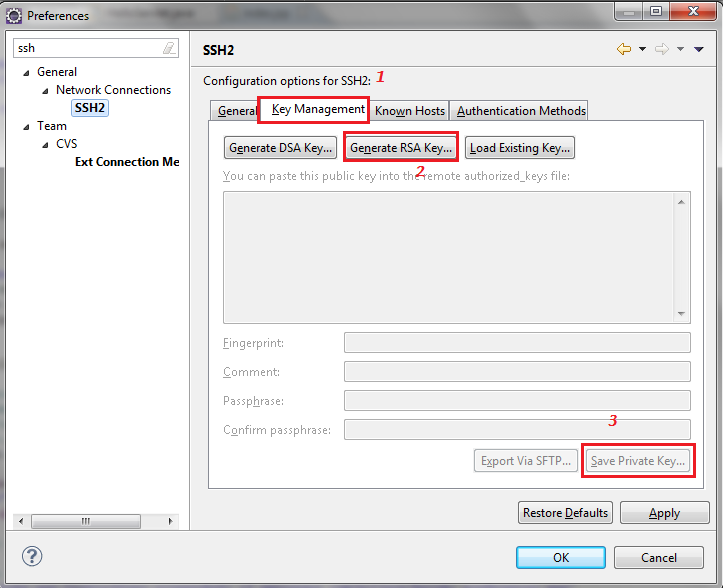- Generate Ssh Key Using Github
- Ssh Key Generation Using Git Code
- Ssh Key Generation Using Git File
- How To Generate Ssh Key Using Git Bash
- Ssh Key Generation Using Git Download
Verify which remotes are using SSH by running git remote -v in your Git client. Visit your repository on the web and select the Clone button in the upper right. Select SSH and copy the new SSH URL. In your Git client, run: git remote set-url.
If you are using another terminal prompt, such as Git for Windows, you can use the 'Auto-launching the ssh-agent' instructions in 'Working with SSH key passphrases', or start it manually: # start the ssh-agent in the background $ eval $(ssh-agent -s) Agent pid 59566; Add your SSH private key to the ssh-agent. To create a new key pair, select the type of key to generate from the bottom of the screen (using SSH-2 RSA with 2048 bit key size is good for most people; another good well-known alternative is ECDSA). Each key pair consists of a private key and a corresponding public key. When you use SSH key for Git, you inform Git that this PC is authenticated for that Github account, and it will never ask you about any access again because you have already given it your SSH key. Git uses SSH keys to securely access your repositories, and in Windows SSH keys are often searched on the wrong path when you try to use Git. If you use an older version of msysGit, you may encounter a step called “Choosing the SSH executables”. GitLab and SSH keys. Git is a distributed version control system, which means you can work locally. In addition, you can also share or “push” your changes to other servers. GitLab supports secure communication between Git and its servers using SSH keys.
-->Azure Repos Azure DevOps Server 2019 TFS 2018 TFS 2017 TFS 2015 Update 3
Choose a method to securely access the code in Azure Repos, Azure DevOps Server 2019, or Team Foundation Server (TFS) Git repositories.Use these credentials with Git at a command prompt. These credentials also work with any Git client that supports HTTPS or SSH authentication.Limit the scope of access and revoke these credentials when they're no longer needed.
Generate Ssh Key Using Github
Important
Azure DevOps no longer supports Alternate Credentials authentication since the beginning of March 2, 2020. If you're still using Alternate Credentials, then they won't work anymore. You have to switch to a more secure authentication method, to mitigate this breaking change impacting your DevOps workflows. Learn more.
Azure DevOps Server was formerly named Visual Studio Team Foundation Server.
Tip
Ssh Key Generation Using Git Code
Using Visual Studio? Team Explorer handles authentication with Azure Repos for you.
Authentication comparison

| Authentication Type | When to use | Secure? | Ease of setup | Additional tools |
|---|---|---|---|---|
| Personal access tokens | You need an easy to configure credential or need configurable access controls | Very secure (when using HTTPS) | Easy | Optional (Git credential managers) |
| SSH | You already have SSH keys set up, or are on macOS or Linux | Very secure | Intermediate | Windows users will need the SSH tools included with Git for Windows |
| Alternate credentials | You can't use personal access tokens or SSH | Least secure | Easy | See important information about alternate credentials |
Personal access tokens
Personal access tokens (PATs) give you access to Azure DevOps and Team Foundation Server (TFS), without using your username and password directly.These tokens have an expiration date from when they're created. You can restrict the scope of the data they can access.Use PATs to authenticate if you don't already have SSH keys set up on your system or if you need to restrict the permissions that are granted by the credential.
Use Git Credential Manager to generate tokens
Git credential managers is an optional tool that makes it easy to create PATs when you're working with Azure Repos.Sign in to the web portal, generate a token, and then use the token as your password when you're connecting to Azure Repos.
PATs are generated on demand when you have the credential manager installed.The credential manager creates the token in Azure DevOps and saves it locally for use with the Git command line or other client.
Driver toolkit licence key generator. Note
Current versions of Git for Windows include the Git credential manager as an optional feature during installation.
SSH key authentication
Ssh Key Generation Using Git File
Key authentication with SSH works through a public and private key pair that you create on your computer.You associate the public key with your username from the web. Azure DevOps will encrypt the data sent to you with that key when you work with Git.You decrypt the data on your computer with the private key, which is never shared or sent over the network.
SSH is a great option if you've already got it set up on your system—just add a public key to Azure DevOps and clone your repos using SSH.If you don't have SSH set up on your computer, you should use PATs and HTTPS instead - it's secure and easier to set up.
Learn more about setting up SSH with Azure DevOps
How To Generate Ssh Key Using Git Bash
Alternate credentials
Ssh Key Generation Using Git Download
Create an alternate user name and password to access your Git repository using alternate credentials.Unlike PATs, this login doesn't expire and can't be scoped to limit access to your Azure DevOps Services data.Use alternate credentials as a last resort when you can't use PATs or SSH keys. Firefox 52 esr download mac.